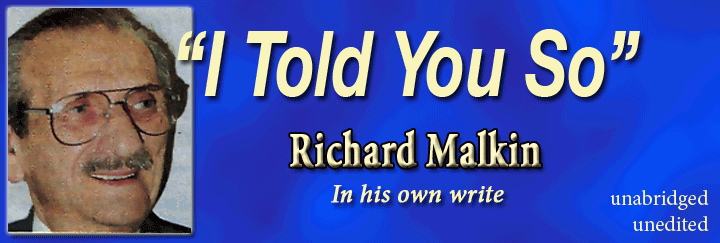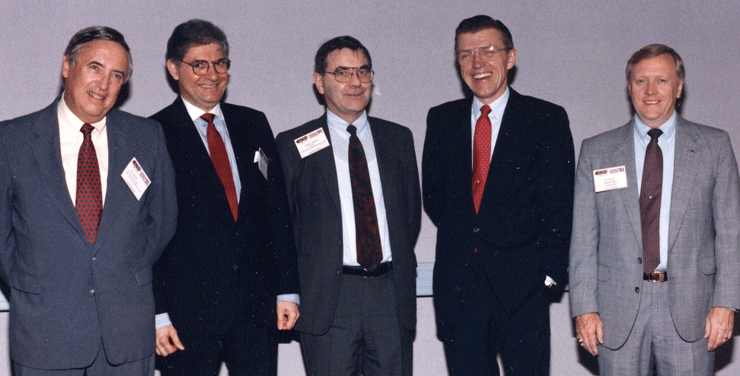| 
 They
say the best things in life are free. One look at the joy and friendship
in this picture, taken almost twenty years ago, will confirm that. Networking
at the second CNS Partnership Conference in Dallas are (L to R) first
CNS President Jack Lindsay, second CNS President Anthony (Tony) Calabrese,
and original CNS Board Members Brian Barrow and Buz Whalen, with American
Airlines CEO Robert Crandall. They
say the best things in life are free. One look at the joy and friendship
in this picture, taken almost twenty years ago, will confirm that. Networking
at the second CNS Partnership Conference in Dallas are (L to R) first
CNS President Jack Lindsay, second CNS President Anthony (Tony) Calabrese,
and original CNS Board Members Brian Barrow and Buz Whalen, with American
Airlines CEO Robert Crandall.
As
Cargo Network Services (CNS) gathers this week in Orlando, Florida, for
its 25th Annual “Partnership Conference,” a private survey
of a representative group of air freight forwarders and cargo agents disclosed
the existence of widespread doubts in IATA’s core adherence to the
principle of the airline-intermediary “partnership.”
Respondents largely indicated that the turnaround
in forwarder/agent opinion deepened as a direct loss of independent authority
and action, and the organization’s reduction to just another IATA
unit.
Over the past quarter-century, the annual
CNS partnership conferences have gained worldwide prominence. As seen
by most of the interviewees, the “partnership” now tilts in
favor of the air carriers.
Present At
The Creation
A quarter-century ago, I was invited by
the sparkling new Cargo Network Service to contribute my experience to
determine an answer to a vexing question: Should CNS, or should it not,
invest time, effort and money in mounting a truly first-class air cargo
conference? With the approval of CNS president Jack Lindsay, the invitation
had been extended by Anthony P. Calabrese, then director of product development,
who was aware of my intimacy with the industry’s growing number
of cargo conferences. I agreed to cooperate—but before I continue
with this report, I find it necessary to outline the air cargo industry
landscape at that time. The scheduled airlines’ long-delayed awakening
of the shipper as an important source of revenue was enriched by their
flair for promotional ideas and public relations. Not much time passed
before one of the carriers invited a section of the shipping public—forwarders,
air cargo agents, industrial traffic managers and purchasing agents—to
a luncheon meeting where they would be treated to a lesson in air cargo
economics as well as to a tasty portion of roast beef.
Competitor airlines gradually followed with
their own versions of satisfying appetites while getting across a hard
sell.
It took a while, but as these meetings became
longer, more detailed, and more sophisticated productions, I gradually
became aware that something was amiss: In virtually every instance, the
airline representatives in the audience seriously outnumbered the customer
attendees.
I editorialized on the problem. Didn’t
the lopsided audience division matter to the carriers? Were they delivering
the right message from the platform? What confined the users’ response
to disappointing limits? The few readers who bothered to answer failed
to cast convincing light on the puzzle.
Tony Calabrese was one of my oldest and
closest friends in the industry. Our nexus, I think, was a shared love
of classical music. Typically, when we sat down with cups of coffee to
discuss the unfairness of an IATA rule or recent breakpoints on electronic
goods, it would wind up with criticism of a conductor’s use of his
baton or on concert artists’ foibles. This time, with Jack Lindsay
present at our meeting at CNS’ offices, Tony came right to the reason
for the meeting without the usual preliminary formalities: On the basis
of my wide experience, what is my personal reaction to a proposal to sponsor
an annual air cargo conference that would take it around the country?
I Told You So
“Oh, no,” I
groaned, and I proceeded to repeat my argument especially when travel
expenses and hotel fees were involved. I predicted failure, and I foresaw
myself saying to Tony, “I told you so.”
Tony was unfazed by my opposition, arguing
that CNS’ built-in membership of several thousand agents represented
a live pool of prospects. There existed an area of common interest and
values. I cited the example of the Civil Aeronautics Board’s sponsorship
of the one-day air cargo conferences scheduled in as many as six cities
throughout the United States.
After the third meeting, appalled by the
paucity of active interest on the customer side, the board cancelled the
remaining shows. In Chicago, with John C. Emery, Jr. as featured speaker,
the meeting’s sponsor was forced to resort to an invitation to a
local business school’s transportation and export students to fill
vacant seats.
Tony was probably aware of these incidents.
In his calm, evenly stated way, he bore down on his confidence in the
CNS agents’ homegrown support. This was basic. There were, too,
the forwarders and shippers.
In the end, Lindsay (after whose retirement
a couple of years later Tony was to succeed as CNS president) went along
with Tony, and the first of Partnership Conferences was born. Over the
years the Partnership Conference, which sprang from Tony’s fertile
mind, was recognized as one of the world industry’s best.
During the closing hours of the initial
meeting, Tony and I were sitting next to each other at a dinner table.
We chatted about the day’s highlights. He had an idea that he wanted
to implement next year, and before he could get into the details, he was
interrupted by an aide who handed him a sheet of paper. Tony glanced at
it briefly, smiled, then the smile broadened into a grin.
“Customer attendance 18% over airline
attendance.”
Whereupon he leaned over to me and sweetly
whispered in to my ear, “I told you so.” |





